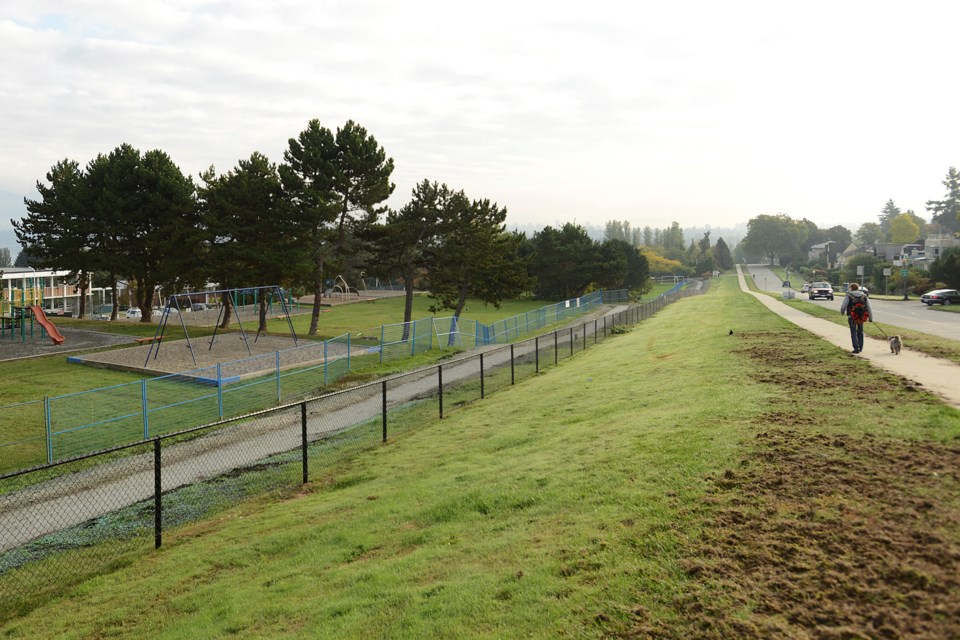Two weeks before the provincial government announced it sold its part of the Jericho Lands, Squamish Nation Chief Ian Campbell told a band meeting in North Vancouver that the partnership with the Musqueam Indian Band and Tsleil-Waututh Nation wants to get 38.8 acres rezoned for townhouses and towers.
“This land can yield way more than 140 houses,” Campbell said in a recording of the March 23 meeting that was leaked to the Courier.
The land was valued at $480 million, but the three nations are paying nothing to acquire it. Campbell said the B.C. Liberal government agreed to give them a $96-million accommodation payment and a seven-year loan at two per cent interest. In 2014, the trio combined with Canada Lands Company to acquire the $237-million, 52-acre federal portion of the Jericho Lands.
Campbell explained that achieving higher density would increase the land value and make it easier to gain financing to payoff the provincial loan. He mentioned the potential to build single-detached houses on the top of the property, townhouses down the slope and midrises and highrises along West Fourth Avenue. He told attendees to expect opposition.
“If you can get a 2.0 [floor space ratio] or more, you can get a lot of highrises, but that means that the discussions with local residents, they’re going to give us feedback, they’re going to give us pushback,” he warned. “They’re going to argue that we’re blocking their views, that they have a say. The local politicians over there are already beaking-off and chirping. You’ll see in the media that [David] Eby, the NDP critic for the province is already talking, as well as Joyce Murray, the federal MP.”
Campbell said the trio has talked with Mayor Gregor Robertson and city hall bureaucrats. “They’re saying yes, there’s a relationship with the city, a city of reconciliation,” but the rezoning process could take two or three years and there are no guarantees.
Campbell said the trio had also met with the West Point Grey Residents Association, but “they seem to think they have a lot of power over there as non-native residents. We’re saying that’s fine, you benefited for 150 years at our expense, it’s now our turn to step in here.”
The highest and best use of the land is residential, but Campbell said they are willing to negotiate community amenities with Vancouver city hall to gain higher density. “A school is an encumbrance, but if you want the school it’s going to cost you a number of decimal points of [floor space ratio], which is going to increase the value,” he said. “We can build the school and lease it back to them.”
Campbell said the provincial government wanted to be a partner, but “we said no way, once the transaction’s done you’re outta here, you no longer have a say, you no longer have any value other than the purchase price.”
There is no development partner yet, but Campbell revealed that David Negrin, president of Aquilini Construction and Development, was an advisor. Aquilini partnered with the same bands in 2014 to buy the Liquor Distribution Branch warehouse in East Vancouver.
The meeting’s question period was, at times, raucous. One woman said “we own this land, we didn’t sign this away, this is unceded land” and described the Musqueam as “squatters” on Squamish land.
Campbell said the Squamish, Musqueam and Tsleil-Waututh, part of the Four Host First Nations for the 2010 Winter Olympics, agreed in 2014 to collaborate, instead of compete, to jointly own land that is subject to overlapping claims. A 2004 Supreme Court of Canada ruling said governments must consult and accommodate First Nations when disposing Crown land.
“We’re hearing the same things in every community. They’re wondering, why are we working together?” Campbell said. “We tried doing it ourselves and it’s very challenging.”
Another attendee slammed Squamish Nation leadership for cutting a fee simple deal instead of relying on the treaty process to increase reserve lands. Campbell said treaty talks with Victoria and Ottawa are slow and expensive. Squamish Nation negotiations stalled two decades ago.
“We’re not extinguishing our title to this land, we’re enhancing it,” he said. “It’s from our title that we have the ability to reacquire these, because they once were stolen from us. We now get them back 100 per cent.”
Chief Ian Campbell did not respond to a request for comment by the Courier’s press time.
@bobmackin



